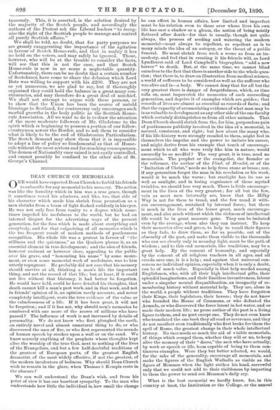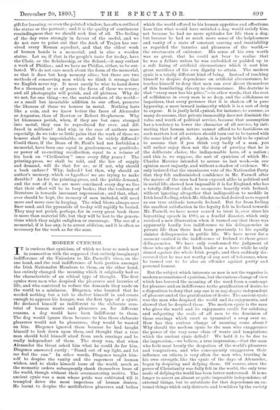DEAN CHURCH ON MEMORIALS.
ONE would have expected Dean Church to forbid his friends to subscribe for any memorial to his memory. The action was like the humility which in him was a true grace, though it sometimes vexed his admirers, and like, too, that side of his character which made him shrink from promotion as a man shrinks from a beam of light flashed suddenly in his eyes. He was not only free from vanity to a degree which some- times impeded his usefulness to the world, but he had an internal disgust for the advertising ways of the present generation, for the fuss which is made about everything and everybody, and for that vulgarising of all memories which is the too frequent result of modern methods of posthumous recognition. His whole life was a protest in favour of " the stillness and the quietness," as the Quakers phrase it, as an essential element in true development ; and the idea of friends, however eminent or however close, appealing to the public over his grave, and "honouring his name" by some monu- ment, or even some memorial work of usefulness, was to him utterly repugnant. He probably did not care that his memory should survive at all, thinking a man's life the important thing, and not the record of that life ; but at least, if it could not live without that blatancy, it had better be forgotten. He would have held, could he have detailed his thoughts, that death cannot kill a man's past work, and in that work, and not in friends' opinion of it, an opinion rarely accurate, and never completely intelligent, rests the true evidence of the value or the valuelessness of a life. If it has been great, it will not be forgotten ; and if it has not, why should men's memories be cumbered with one more of the scores of millions who have passed ? The influence of work is not increased by details of personality. We do not know who first ploughed the earth, an entirely novel and almost unnatural thing to do, or who -discovered the uses of fire, or who first represented the sounds of human speech by strokes upon a wall or on the sand. We know scarcely anything of the prophets whose thoughts kept alive the worship of the true God, next to nothing of the lives of the Evangelists, and but a few half-doubtful traditions of the greatest of European poets, of the greatest English dramatist, of the most widely effective, if not the greatest, of the modern inculcator; of holiness. Why should Dean Church wish to remain in the glare, when Thomas it Kempis rests in the obscure P
We can well understand the Dean's wish, and from his point of view it has our heartiest sympathy. To the man who understands how little the individual is, how small the change
he can effect in human affairs, how limited and imperfect must be his relation even to those over whose lives his own life has cast a shadow or a gleam, the notion of being noisily flattered after death—for that is usually, though not quite always, the process of seeding and watering the modern memorial—must always be repellent, as repellent as is to many minds the idea of an autopsy, or the threat of a public funeral. He must shrink from such a scene as from an im- modesty, and feel that in creating it his friends will, as Lord Lyndhurst said of Lord Campbell's biographies, " add a new horror" to death. But, at the same time, we cannot blind ourselves to the fact that there is another side to the whole ques- tion; that there is, to draw an illustration from medical science, a world of sufferers to be considered as well as the sufferer who was alive and is—a body. We cannot deny that for all but the very greatest there is danger of forgetfulness, which, as time rolls on, must impoverish the memories of each succeeding generation, and deprive it of examples which are guides ; that records of lives are almost as essential as records of facts; and that the capacity of accumulating evidence of what man may be is as valuable to development as any other side of the one faculty which certainly distinguishes us from all other animals. That Dean Church should shrink from the, for him, purposeless pain of posthumous publicity involved in the idea of a memorial, is natural, consistent, and right; but how about the many who, if his life-history were strongly recalled to them, might feel in themselves the impulse and the power to imitate his career, and might derive from his example that touch of encourage- ment which to all who were truly like him in nature, would assuredly be so needful ? The very great, it is true, need no memorials. The prophet or the evangelist, the founder or the reformer, the author of the Iliad, of Hamlet, or of the "Imitation of Christ," needs no help from stone or brass ; nor, if any generation forgot the man in his revelation or his work, would it be much the worse ; but starlight has its use as well as sunlight, and in losing cognisance of those myriad twinkles, we should lose very much. There is little encourage- ment in the lives of the very greatest ; for all but the few, vain as most men internally are, know that the Milky Way is not for them to tread, and the few tread it with- out encouragement, sustained by internal force; but there is much in the lives of the lesser great, much encourage- ment, and also much without which the richness of intellectual life would be in great measure gone. They can be imitated even by the average, whom also they can instruct. To keep their memories alive and green, to help to recall their figures as they fade, to draw them, so far as possible, out of the obscurity of the past, and make them visible to the thousands who can see clearly only in noonday light, must be the path of wisdom ; and to this end memorials, like traditions, may be a great help. By the consent of humanity, and especially by the consent of all religious teachers in all ages, and all creeds save one, it is a help ; and against that universal con- sensus no individual opinion, especially when it is only a doubt, can be of much value. Especially is that help needed among Englishmen, who, with all their high intellectual gifts, their splendid imaginations, and their limitless inventiveness, labour under a singular mental disqualification, an incapacity of re- membering history without material help. They are, alone in the world, a people without traditions. They have forgotten their Kings, their legislators, their heroes ; they do not know who founded the House of Commons, or who defeated the Armada, or who discovered the force latent in hot water, and so made their modern life ; no prose author of the past is a living figure to them, and no poet except one. They do not even know who translated the one book they all read or reverence, and they do not recollect even traditionally who first broke for them the spell of Rome, the greatest change in their whole intellectual history. No race needs so much the aid of visible memorials, of things which compel them, whether they will or no, to keep alive the memory of their " doers," the men who have actually, by work or speech or life, been capable of being to them con- tinuous examples. Were they but better selected, we would, for the sake of the generality, encourage all memorials, and make the figures of the English Walhalla as visible as the figure of Memnon when the light strikes his head, sorrowful only that we could not add to their visibleness by imparting to them the power to send out Memnon's daily cry.
What is the best memorial we hardly know, for, in this country at least, the Institution or the College, or the annual gift for learning, or even the painted window, has often outlived the statue or the portrait ; and it is the quality of continuous remindingness that we should seek first of all. The feeling of the day runs strongly in favour of the useful, and we do not care to point out that the Arch of Trajan has sur- vived every Roman aqueduct, and that the oldest work of human hands is a memorial, and is also a wooden statue. Let us, if that is the people's taste for to-day, have the Chair, or the Scholarship, or the School,—it may outlast a work of Phidias ; and we have no Phidias, either, to be out- lasted. We do not care much about the form of the memorial, so that it does but keep memory alive; but there are two methods of conserving men which we think it strange that we English never try. It must surely be wise to hand down for a thousand or so of years the faces of those we revere ; and all photographs will perish, and all pictures. Why do we not, for one thing—we, the metal-workers of the world— as a small but invariable addition to our effort, preserve the likeness of those we honour in metal. Nothing lasts like a coin, and we know better the faces of Alexander or Augustus, than of Newton or Robert Stephenson. Why let likenesses perish, when, if they are but once stamped into metal, they can be reproduced for ever, and dif- fused in millions? And why, in the case of authors more especially, do we take so little pains that the work of those we honour shall be imperishable, or shall be widely diffused P Could there, if the Dean of St. Paul's had not forbidden a memorial, have been one equal in graciousness, or gratitude, or power of re-exciting recollection, equal to a reissue of his book on " Civilisation " once every fifty years P The printing-press, we shall be told, and the law of supply and demand, will do that for us ; or if not, why should a book endure P Why, indeed ? but then, why should an author's memory, which ex hypothesi we are trying to make durable P As for the printing-press, and the public demand, and the rest of it, we are more convinced every day we live that their effect will be to bury books; that the tendency of literature is towards incessant supersession ; and that, what- ever should be kept, the memory of men included, will need more and more care in keeping. The wind blows always over finer sand, and the pyramids of to-day will rapidly be buried. They may not perish, perhaps, for in every great book there is more than material life, but they will be lost to the genera- tions which they might enlighten or encourage. The use of a memorial, if it has any, is to arrest oblivion, and it is often as necessary for the work as for the man.











































 Previous page
Previous page